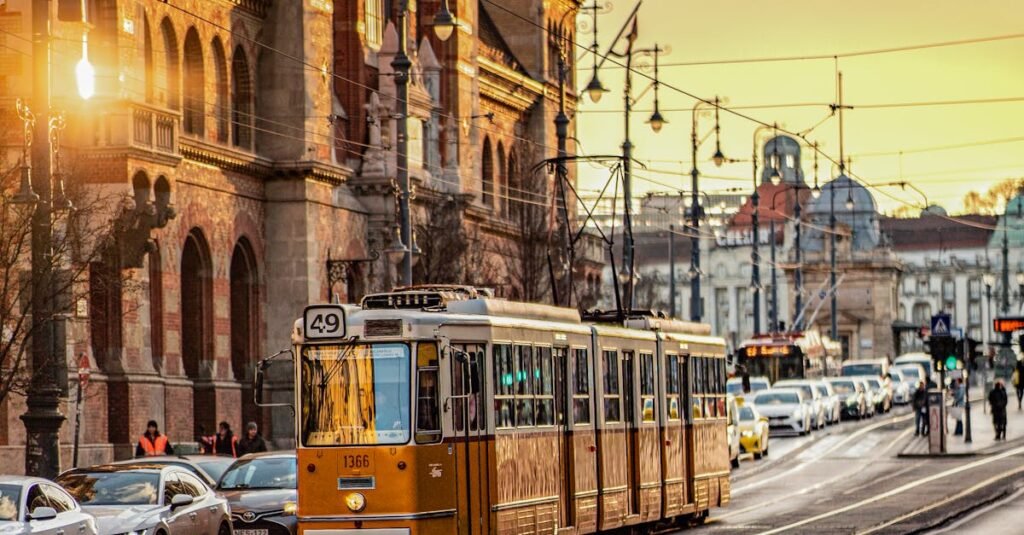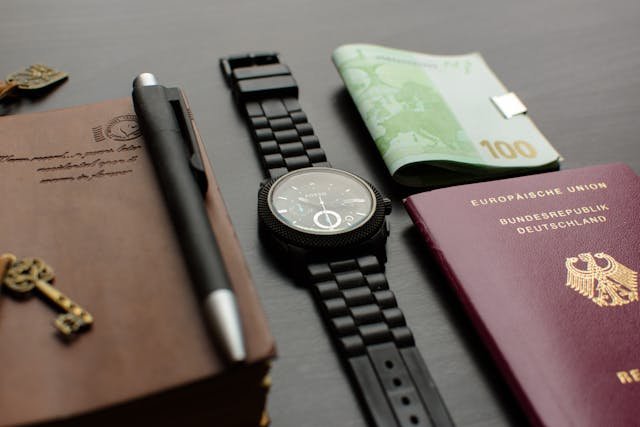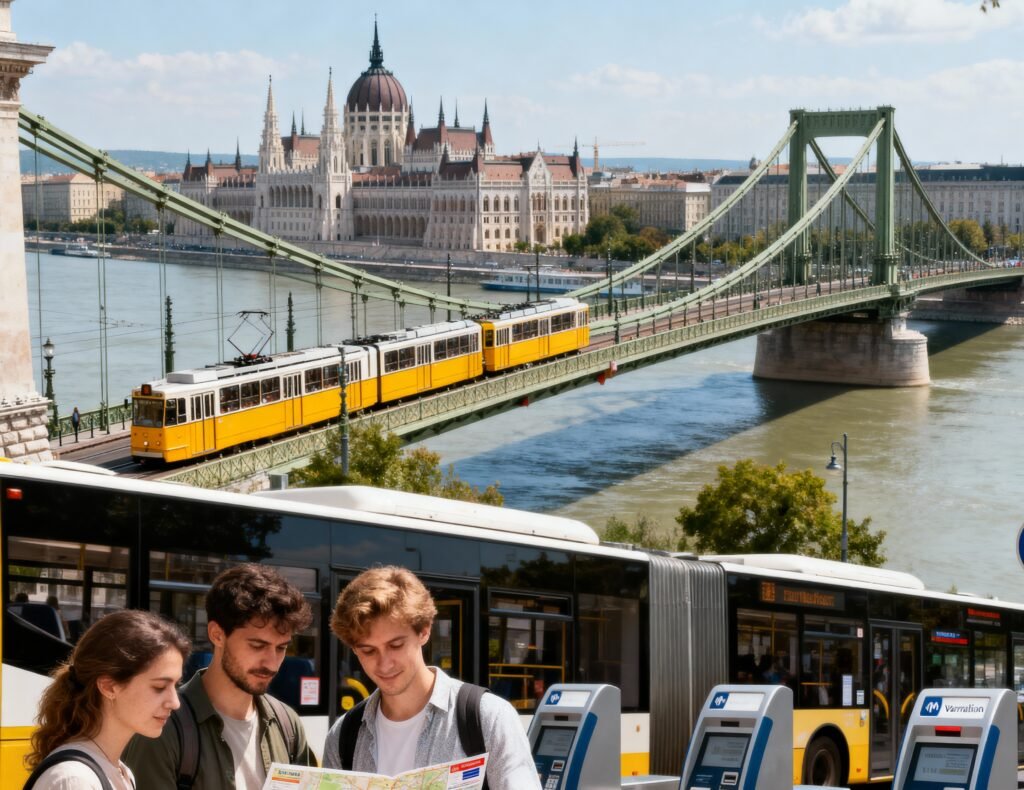Budapest continues to captivate international relocators in 2025, offering an irresistible blend of architectural splendor, affordability, and cultural richness that few European capitals can match. With Hungary’s enhanced digital nomad infrastructure, streamlined visa processes, and post-pandemic economic resilience, the “Pearl of the Danube” has emerged as a premier destination for expats seeking both adventure and stability.
Whether you’re drawn by the thriving tech scene, the café culture that rivals Vienna’s, or the thermal baths that promise year-round relaxation, moving to Budapest in 2025 requires careful planning and insider knowledge. This comprehensive guide delivers everything you need to transform your relocation from overwhelming to seamless.
Quick Takeaways: Your Budapest Move at a Glance
- Planning Timeline: Start 3-6 months before your move date
- Average Monthly Living Costs: €650-863 for a single person
- Visa Processing Time: 6-12 weeks for most categories
- Best Moving Seasons: March-May or September-November
- Language Requirement: None for visa, but basic Hungarian helps tremendously
- Housing Market: Average 1-bedroom rent €486-543 (varies by district)

Pre-Move Planning: Your 3-6 Month Countdown Strategic Timeline Development
Success in relocating to Hungary begins with meticulous pre-planning. Create a dedicated Google Drive folder immediately—this digital command center will house every document, receipt, and reference you’ll need throughout your journey.
Month 6-4 Before Moving:
- Research and select your visa category based on your situation
- Begin apostilling crucial documents (birth certificates, degrees, marriage certificates)
- Schedule comprehensive health checks and update vaccinations
- Open an international bank account with favorable foreign transfer terms
- Join Facebook groups like “Budapest Expats” and “Foreigners in Budapest” for real-time insights
Month 3-2 Before Moving:
- Submit visa application at your local Hungarian consulate
- Secure temporary accommodation for your first month
- Research neighborhoods aligned with your lifestyle and budget
- Begin learning basic Hungarian phrases through apps like Duolingo
- Arrange pet documentation if applicable (EU pet passport required)
Month 1 Before Moving:
- Confirm accommodation and coordinate key handover
- Purchase comprehensive travel insurance
- Set up mail forwarding from your home country
- Download essential apps: BKK FUTÁR (public transport), Bolt (rideshare), Wolt (food delivery)
- Exchange currency for initial expenses (carry at least €500 in cash)
Visa and Legal Requirements: Updated 2025 Regulations
Hungary’s visa landscape in 2025 offers multiple pathways for expats, each with specific requirements and benefits:
| Visa Type | Duration | Key Requirements | Processing Time |
| Tourist/Short-Stay | 90 days visa-free (Schengen) | Valid passport | Immediate at border |
| Long-Stay Visa (D) | 90+ days | Proof of accommodation, €7,200+ funds, health insurance | 6-12 weeks |
| Residence Permit | 1-2 years renewable | Apply within 30 days of entry, biometric data | 4-8 weeks |
| EU Blue Card | 2 years | Salary 1.5× national average, highly skilled position | 8-12 weeks |
| Digital Nomad Visa | 1 year renewable | Remote employment, €2,000/month income proof | 6-10 weeks |
Critical Documentation Checklist:
- ✓ Passport valid for 6+ months beyond intended stay
- ✓ Apostilled birth certificate
- ✓ Criminal background check (less than 3 months old)
- ✓ Proof of accommodation (rental agreement or hotel booking)
- ✓ Bank statements showing €7,200+ annual living costs
- ✓ Comprehensive health insurance policy
- ✓ Employment contract or proof of remote work
- ✓ Passport photos meeting Hungarian specifications
Insider Tip: Book your consulate appointment immediately upon deciding to move—slots fill quickly, especially for September arrivals coinciding with the academic year.
Financial Planning and Banking Setup
Understanding Hungary’s financial landscape is crucial for your Budapest expat guide success:
Tax Structure 2025:
- Personal income tax: Flat 15% on most income
- Social security contributions: 18.5% (employee), 13% (employer)
- Minimum wage: HUF 290,800 gross monthly
- Guaranteed wage: HUF 348,000 for skilled positions
Pre-Arrival Banking Strategy:
- Open a Wise or Revolut account for optimal exchange rates
- Notify your home bank of your relocation plans
- Understand FATCA requirements if you’re a US citizen
- Research Hungarian banks accepting expats: OTP, Erste, UniCredit
- Prepare for initial deposit requirements (typically €500-1,000)
Hidden Financial Considerations:
- SZÉP Card benefits: Up to HUF 570,000/year tax-free for dining, recreation, accommodation
- 27% VAT on most goods (EU’s highest)
- Utility deposits typically equal 2-3 months of estimated usage
- Notary fees for rental contracts: HUF 5,000-10,000
Health Insurance Options for Expats
Healthcare navigation begins before you arrive:
Public Healthcare (NEAK):
- Mandatory contribution: HUF 11,800/month if not employed
- Coverage includes GP visits, emergency care, hospital treatment
- Registration required at local NEAK office within 30 days
- European Health Insurance Card (EHIC) valid for EU citizens
Private Insurance Advantages:
- English-speaking doctors guaranteed
- Shorter wait times for specialists
- Direct billing vs. reimbursement model
- Coverage for repatriation and medical evacuation
Recommended Private Providers:
- DKV Hungary: Comprehensive expat packages
- Allianz Worldwide Care: Global coverage options
- Generali: Local presence with international standards
- Medicover: Own clinic network in Budapest

Finding Housing in Budapest: Navigate the Market Like a Local
Best Neighborhoods for Expats: Buda vs Pest Analysis
The eternal Budapest question—Buda or Pest?—shapes your entire living experience. Here’s your Budapest neighborhoods for expats decoder:
Pest Side (Dynamic Urban Living):
Districts V, VI, VII – City Center:
- Character: Vibrant nightlife, ruin bars, cultural epicenter
- Average 1-bed rent: €800-1,500
- Best for: Young professionals, digital nomads, culture enthusiasts
- Drawbacks: Tourist crowds, higher prices, limited parking
- Hidden Gem: Andrássy út apartments offer surprising quiet despite central location
District XIII – Újlipótváros:
- Character: Modern developments, riverside views, family-friendly
- Average 1-bed rent: €700-1,100
- Best for: Families, long-term expats, remote workers
- Perks: Margaret Island proximity, newer infrastructure, good schools
- Insider Tip: Look for apartments near Pozsonyi út for the best local market access
Buda Side (Tranquil Residential Haven):
Districts I, II – Castle District & Rózsadomb:
- Character: Historic charm, green spaces, embassy quarter
- Average 1-bed rent: €600-1,200
- Best for: Established professionals, retirees, nature lovers
- Advantages: Cleaner air, hiking trails, prestigious address
- Challenge: Limited nightlife, steeper commutes
District XII – Hegyvidék:
- Character: Suburban feel within city limits
- Average 1-bed rent: €600-900
- Best for: Families seeking space and nature
- Unique Feature: Normafa park for year-round outdoor activities
Current Rental Market Prices and Trends
The Budapest housing market 2025 presents both opportunities and challenges:
Market Snapshot:
- Average monthly rent: HUF 230,000 (€600) citywide
- Year-on-year increase: 6.7%
- Utilities additional: €150-400/month depending on season
- Security deposit standard: 2 months rent
- Agency fees: 1 month rent + VAT
Seasonal Pricing Patterns:
- September-October: Peak prices (15-20% higher) due to student influx
- March-May: Moderate pricing with good inventory
- January-February: Best deals but limited selection
- July-August: Tourist rentals compete with long-term options
Money-Saving Strategies:
- Consider districts XV, XXI, XXIII for budget options (€410-495/month)
- Negotiate directly with landlords to avoid agency fees
- Look for “panel” apartments—communist-era buildings with modern renovations
- Join “Budapest Rooms and Flats for Rent” Facebook group for direct listings
- Consider flat-sharing initially to understand neighborhoods better
Property Buying Process for Foreigners
For those considering permanent roots:
Purchase Eligibility:
- EU citizens: Unrestricted purchasing rights
- Non-EU citizens: Permission required from local government
- Investment threshold: No minimum, but expect €100,000+ for decent properties
Current Market Prices (2025):
- Used properties: HUF 1.2 million/sqm average
- New builds (premium districts): HUF 2 million/sqm
- Transfer tax: 4% of purchase price
- Notary fees: 1% of purchase price
- Legal fees: 1-2% for buyer’s attorney
Purchase Process Timeline:
- Week 1-2: Property viewing and selection
- Week 3: Price negotiation and preliminary agreement
- Week 4-6: Due diligence and mortgage arrangement if needed
- Week 7-8: Contract signing at notary
- Week 9-10: Property registration and key handover
Essential Administrative Tasks: Your Bureaucracy Survival Guide
Residence Permits and Registration
Upon arrival, the administrative marathon begins:
First 72 Hours:
- Register your address at the local district office (kerületi hivatal)
- Required documents: rental contract, passport, visa
- Fee: HUF 5,000 for registration card
- Processing: Usually same-day
Within 30 Days:
- Apply for residence permit at National Directorate-General for Aliens Policing (NDGAP)
- Book appointment online via Enter Hungary platform
- Biometric data collection mandatory
- Card delivery: 4-6 weeks to registered address
Pro Tip: Hire a translator for your first NDGAP visit—it’s worth the HUF 10,000 investment to ensure accuracy.
Tax Obligations and Social Security
Navigate Hungary’s tax system efficiently:
Tax Registration Process:
- Obtain tax number (adószám) from NAV office
- Register for social security (TAJ card) at NEAK
- Understand your tax residency status (183-day rule applies)
- Set up quarterly advance tax payments if self-employed
Social Security Benefits Include:
- Healthcare coverage after 1 year of contributions
- Unemployment benefits (65% of average wage for 90 days)
- Pension contributions counting toward EU-wide benefits
- Family allowances for children
Setting Up Utilities and Internet
Transform your apartment into a functioning home:
Utility Setup Timeline:
- Electricity (ELMŰ-ÉMÁSZ): 5-7 business days
- Gas (Magyar Földgáz): 7-10 business days
- Water (Fővárosi Vízművek): 3-5 business days
- Internet: 3-7 days installation
Internet Providers Comparison:
| Provider | Speed | Monthly Cost | English Support |
| DIGI | 1 Gbps | HUF 5,000 | Limited |
| Magyar Telekom | 1 Gbps | HUF 7,500 | Yes |
| Vodafone | 500 Mbps | HUF 6,500 | Yes |
| UPC | 1 Gbps | HUF 8,000 | Yes |
Monthly Utility Budget Guide:
- Electricity: €40-80 (seasonal variation)
- Gas heating: €30-100 (winter peaks)
- Water: €20-30
- Internet/Cable: €15-25
- Mobile phone: €10-30
Practical Living Information: Master Daily Life
Public Transportation System and Costs
Budapest’s public transport remains Europe’s best value:
2025 Ticket Prices:
- Single ticket: HUF 500
- 90-minute ticket: HUF 850
- 24-hour pass: HUF 2,500
- Monthly pass: HUF 8,950
- Annual pass: HUF 89,500 (best value)
Transportation Apps Essential:
- BKK FUTÁR: Real-time arrivals, route planning
- Google Maps: Reliable for public transport
- Bolt/Uber: Rideshare alternatives
- MOL Bubi: Bike-sharing system (HUF 50/minute)
Insider Navigation Tips:
- Metro Line 4 offers mobile coverage throughout
- Night buses (900-series) run every 30 minutes
- Validate paper tickets immediately or face HUF 16,000 fine
- Monthly passes valid on suburban HÉV trains within city limits
- Airport shuttle (100E) requires special ticket (HUF 2,200)
Healthcare System Navigation
Master the dual healthcare system:
Public Healthcare Navigation:
- Register with district GP (háziorvos) first
- Referrals required for specialists
- Emergency number: 112 (English-speaking operators)
- EU citizens use EHIC for immediate coverage
Private Healthcare Options:
- FirstMed Centers: Full English service, no insurance needed
- Medicover: Membership-based comprehensive care
- Dr. Rose Private Practice: Popular with expats
- Rózsakert Medical Center: Premium facilities
Pharmacy Essentials:
- 24-hour pharmacies in each district
- Prescription requirements stricter than many countries
- Generic medications significantly cheaper
- “Gyógyszertár” = pharmacy in Hungarian
Education Options for Expat Families
International Schools Overview:
| School | Curriculum | Annual Tuition | Language |
| British International School | British/IB | €12,000-18,000 | English |
| American International School | American/IB | €15,000-22,000 | English |
| Lycée Français | French Baccalaureate | €8,000-12,000 | French/English |
| Deutsche Schule | German Abitur | €9,000-14,000 | German/English |
Local School Integration:
- Hungarian public schools free for residents
- Language support programs available
- After-school Hungarian tutoring common
- International sections in select public schools
Cultural Integration: Become a Budapest Insider
Hungarian Language Basics
While English proficiency grows annually, basic Hungarian opens doors:
Survival Phrases:
- Köszönöm (KØ-sø-nøm) – Thank you
- Jó napot (YOH NAH-pot) – Good day (formal greeting)
- Viszlát (VEES-laht) – Goodbye
- Beszél angolul? (BES-ayl ON-go-lool) – Do you speak English?
- Hol van…? (HOHL vahn) – Where is…?
- Mennyibe kerül? (MEN-nyee-beh KEH-rewl) – How much?
- Egy sört kérek (EDJ shørt KAY-rek) – One beer please
Language Learning Resources:
- Babilon Language School: Intensive expat courses
- Ulysses Language School: Evening classes for workers
- iTalki: Online tutors from HUF 3,000/hour
- Magyaróra: Free conversation clubs Wednesdays
Cultural Norms and Business Etiquette
Social Customs:
- Remove shoes when entering homes
- Bring odd-numbered flowers (never chrysanthemums)
- Toast with “Egészségedre” (to your health) but never clink beer glasses
- Name order reversed: family name first
- Punctuality highly valued (arrive 5 minutes early)
Business Culture:
- Formal dress unless explicitly stated otherwise
- Use titles (Dr., Professor) until invited otherwise
- Business cards exchanged with both hands
- Small talk precedes business discussions
- Lunch is the main meal (12:00-13:00 sacred)
Social Activities and Expat Communities
Active Expat Groups:
- Budapest Expats Facebook Group: 45,000+ members
- InterNations Budapest: Monthly networking events
- Budapest Digital Nomads: Co-working and social meetups
- Hiking in Hungary: Weekend nature excursions
- Budapest Wine Society: Tastings and vineyard tours
Cultural Integration Activities:
- Thermal bath culture: Get a monthly pass to Széchenyi or Gellért
- Ruin bar crawls: Start at Szimpla Kert, explore District VII
- Market visits: Central Market Hall Saturdays for authentic experience
- Concert venues: Budapest has Europe’s highest concert density
- Language exchange: Every Tuesday at Grund café
Financial Considerations: Budget Like a Local
Cost of Living Breakdown (2025 Updated)
Monthly Budget for Single Person:
| Category | Budget | Moderate | Comfortable |
| Rent (1-bedroom) | €400-500 | €600-800 | €900-1,500 |
| Utilities | €100-150 | €150-200 | €200-300 |
| Groceries | €150-200 | €250-300 | €350-450 |
| Transport | €30 | €30 | €50-100 |
| Dining Out | €50-100 | €150-250 | €300-500 |
| Entertainment | €50-100 | €100-200 | €200-400 |
| Total | €780-980 | €1,280-1,780 | €2,000-3,250 |
Grocery Shopping Strategy:
- Lidl/Aldi: 30-40% cheaper than competitors
- Tesco/Auchan: Wide selection, moderate prices
- Spar/CBA: Convenient but pricier
- Local markets: Freshest produce, best prices
- Central Market Hall: Tourist prices, avoid for regular shopping
Banking and Payment Systems
Payment Landscape 2025:
- Card acceptance nearly universal
- Contactless payments standard
- Cash still needed for markets, small shops
- PayPal/Wise widely accepted online
- Cryptocurrency ATMs increasingly common
Banking Tips:
- OTP Bank: Largest network, expat-friendly
- Erste Bank: English online banking
- UniCredit: EU-wide presence
- Monthly fees: HUF 500-2,000 typical
- ATM withdrawals: Free from your bank’s network
Currency Exchange Tips
Best Exchange Practices:
- Never exchange at airport (30% worse rates)
- Avoid Váci utca exchange offices (tourist trap)
- Use Correct Change or Gold Change offices
- Wise/Revolut for daily spending
- Keep receipts for amounts over €10,000
Current Exchange Rates (August 2025):
- 1 EUR = ~385 HUF
- 1 USD = ~355 HUF
- 1 GBP = ~450 HUF
Final Moving Week Checklist
Seven Days Before Departure:
- [ ] Confirm accommodation and arrival time with landlord
- [ ] Purchase comprehensive travel insurance
- [ ] Pack essential documents in carry-on
- [ ] Download offline maps of Budapest
- [ ] Exchange €500-1,000 for immediate expenses
- [ ] Activate international roaming temporarily
- [ ] Send copies of documents to trusted contact
Three Days Before:
- [ ] Check-in online for flights
- [ ] Confirm airport transfer arrangement
- [ ] Pack EU adapters (Type C/F)
- [ ] Prepare cash for first month’s expenses
- [ ] Final document check (passport, visa, insurance)
- [ ] Set up VPN for accessing home country services
Day of Travel:
- [ ] House/apartment final walkthrough
- [ ] Arrive at airport 3 hours early for international flights
- [ ] Keep all receipts for potential tax deductions
- [ ] Activate eSIM upon landing
- [ ] Message landlord/hotel upon departure

First Month in Budapest: Priority Actions
Week 1: Foundation Setting
Monday-Tuesday:
- Register address at district office
- Open Hungarian bank account
- Purchase Hungarian SIM card (Vodafone/Telekom/Telenor)
Wednesday-Thursday:
- Apply for residence permit at NDGAP
- Register with local GP
- Set up utilities transfer
Friday-Weekend:
- Explore neighborhood amenities
- Purchase monthly transport pass
- Join local expat Facebook groups
Week 2: Administrative Completion
- Obtain tax number from NAV
- Register for TAJ (social security) card
- Schedule Hungarian driving license exchange (if applicable)
- Enroll in Hungarian language course
- Set up home internet installation
Week 3: Cultural Integration
- Attend first expat meetup event
- Explore three different neighborhoods
- Try five traditional Hungarian restaurants
- Visit thermal bath for local experience
- Start apartment personalization
Week 4: Settling In
- Complete remaining paperwork
- Establish routine (gym, grocery shopping, etc.)
- Connect with neighbors
- Plan first weekend trip outside Budapest
- Schedule follow-up appointments as needed
Emergency Resources and Important Contacts
Emergency Numbers:
- General Emergency: 112
- Ambulance: 104
- Police: 107
- Fire Department: 105
- 24/7 English Medical Hotline: +36 1 200 0100
Useful Services:
- NDGAP Immigration Office: +36 1 463 9100
- Tax Office (NAV): +36 1 427 3560
- US Embassy: +36 1 475 4400
- UK Embassy: +36 1 266 2888
- Canadian Embassy: +36 1 392 3360
Mental Health Resources:
- Awakening Counseling: English therapy services
- Mindwell Psychology: Expat-focused support
- Delej: Anonymous crisis hotline (116-123)
Seasonal Considerations: When to Make Your Move
Best Moving Seasons:
Spring (March-May):
- ✓ Mild weather (15-20°C)
- ✓ Rental market inventory increases
- ✓ City awakens from winter hibernation
- ✗ Occasional rain
- ✗ Tourist season begins
Fall (September-November):
- ✓ Perfect weather (15-22°C)
- ✓ Cultural season in full swing
- ✓ Wine harvest festivals
- ✗ Student competition for housing
- ✗ Shorter days
Seasons to Avoid:
Summer (June-August):
- Tourist peak prices
- Many locals on vacation
- Extreme heat possible (35°C+)
- Limited housing inventory
Winter (December-February):
- Harsh weather (-5 to 5°C)
- Higher utility costs
- Limited daylight (16:30 sunset)
- Seasonal depression risk
Digital Nomad Considerations
Tech Infrastructure Excellence:
- Average internet speed: 150 Mbps (Top 20 globally)
- 5G coverage throughout central Budapest
- Co-working spaces: 50+ options citywide
- Tech meetups: 3-5 weekly events
Best Co-working Spaces:
| Space | Daily Rate | Monthly | Amenities |
| Impact Hub | €20 | €200 | 24/7 access, events |
| KAPTAR | €15 | €150 | Rooftop terrace |
| Design Terminal | €18 | €180 | River views |
| Kubik | €12 | €120 | Artist community |
| Loffice | €25 | €250 | Premium facilities |
Digital Nomad Visa Requirements:
- Remote employment proof
- €2,000/month minimum income
- Health insurance coverage
- Clean criminal record
- Processing: 30-45 days
Conclusion: Your Budapest Adventure Awaits
Moving to Budapest in 2025 represents more than a relocation—it’s an investment in a lifestyle that balances European sophistication with remarkable affordability. From the cobblestoned streets of the Castle District to the innovative tech hubs of District XIII, Budapest offers every expat a chance to write their own success story.
The path from planning to settling requires dedication, but armed with this comprehensive guide, you’re equipped to navigate every challenge. Remember that perfection isn’t the goal—progress is. Each administrative hurdle cleared, each Hungarian phrase learned, and each new friendship forged brings you closer to calling Budapest home.
Your Immediate Action Steps:
- Today: Create your relocation folder and timeline
- This Week: Research visa requirements for your situation
- This Month: Join Budapest expat groups and begin networking
- Next Month: Start your visa application process
- Ongoing: Practice basic Hungarian daily (even 10 minutes helps)
Download Your Resources:
Transform this guide into your personal action plan. Create a spreadsheet tracking:
- Document collection status
- Visa application progress
- Housing search findings
- Budget calculations
- Contact information collected
- Hungarian phrases learned
Final Insider Wisdom:
Budapest rewards the patient and punishes the rushed. Allow yourself grace during the adjustment period—culture shock is real, bureaucracy can frustrate, and winter will test your resolve. But when spring arrives and you’re sipping coffee at your neighborhood café, chatting with the owner in broken Hungarian while planning your weekend trip to Lake Balaton, you’ll understand why thousands of expats choose to make Budapest their permanent home.
The Danube city doesn’t just welcome foreigners; it transforms them into Budapestiek—those who belong to Budapest. Your journey from expat to local begins with a single step. Make it today.
Ready to start your Budapest adventure? Save this guide, share it with fellow future expats, and remember—every current Budapest resident was once exactly where you are now. If they succeeded, so will you.
Last Updated: August 2025 | Bookmark this page for regular updates as regulations and prices change.


